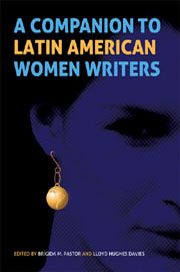Book contents
- Frontmatter
- Contents
- Introduction: The Feminine Voice in Latin American Literature
- 1 Sor Juana Inés de la Cruz (1648/51?–1695)
- 2 Gertrudis Gómez de Avellaneda (1814–1873)
- 3 Gabriela Mistral (1889–1957)
- 4 Alfonsina Storni (1892–1938)
- 5 Silvina Ocampo (1903–1993)
- 6 Clarice Lispector (1920–1977)
- 7 Rosario Castellanos (1925–1974)
- 8 Elena Poniatowska (1933– )
- 9 Alejandra Pizarnik (1936–1972)
- 10 Luisa Valenzuela (1938– )
- 11 Isabel Allende (1942– )
- 12 Rosario Ferré (1938– )
- 13 Laura Esquivel (1950– )
- 14 Laura Restrepo (1950– )
- Conclusion
- Bibliography
- Index
3 - Gabriela Mistral (1889–1957)
Published online by Cambridge University Press: 05 February 2013
- Frontmatter
- Contents
- Introduction: The Feminine Voice in Latin American Literature
- 1 Sor Juana Inés de la Cruz (1648/51?–1695)
- 2 Gertrudis Gómez de Avellaneda (1814–1873)
- 3 Gabriela Mistral (1889–1957)
- 4 Alfonsina Storni (1892–1938)
- 5 Silvina Ocampo (1903–1993)
- 6 Clarice Lispector (1920–1977)
- 7 Rosario Castellanos (1925–1974)
- 8 Elena Poniatowska (1933– )
- 9 Alejandra Pizarnik (1936–1972)
- 10 Luisa Valenzuela (1938– )
- 11 Isabel Allende (1942– )
- 12 Rosario Ferré (1938– )
- 13 Laura Esquivel (1950– )
- 14 Laura Restrepo (1950– )
- Conclusion
- Bibliography
- Index
Summary
Long before she died, Gabriela Mistral – Nobel Prize-winning poet, teacher, widely travelled diplomat and prolific prose writer – had become a revered icon in Chile. Yet, the hundreds of thousands of her compatriots who flocked to pay their last respects to la divina Gabriela [the divine Gabriela] (Figueroa, 1933) in January 1957, knew very little of her work apart from the so-called 'sentimental' poems of Desolación [Desolation] and the lullabies that everyone had learnt at school. During the 1960s several attempts were made to promote a more detailed study of Mistral's oeuvre, but it was not until the late 1970s, when much of her previously unedited prose and correspondence was published for the first time, that any serious reclamation took place (see, for example, Scarpa, 1977 and 1978; Céspedes, 1978; and Larraín, 1978). The Pinochet regime was keen to support such efforts and went so far as to name a new private university and a major publishing house after Mistral, because (unlike Pablo Neruda, Chile's other Nobel laureate) neither her writings nor her persona was perceived as a threat. As noted by Nicola Miller, the dominant image of Mistral, in both literary criticism and biography, was that of ‘a conservative woman, who dismissed the issue of women's rights, sanctified motherhood, and remained content to operate within the precincts of the patriarchal state’ (2005: 136).
The Centennial of Mistral's birth (1989), which coincided with Chile's return to democracy, provoked a surge of studies on her life and work, many of which challenged the traditional image of Mistral as apolitical, passive ‘Mother of the Nation’.
- Type
- Chapter
- Information
- A Companion to Latin American Women Writers , pp. 55 - 68Publisher: Boydell & BrewerPrint publication year: 2012



